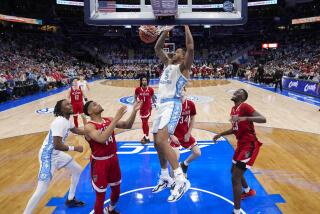Defense sets No. 1 Virginia apart from other NCAA tournament top seeds, Villanova, Kansas and Xavier
There is nothing flashy or explosive about the way Virginia plays basketball.
The Cavaliers aren’t known for pushing the pace or raining three-pointers. None of their starters rank among the top scorers in the nation.
The team from Charlottesville will enter the 2018 NCAA men’s tournament as a top seed because of something less glamorous.
Defense. Loads of defense.
“We’re a possession-by-possession team,” guard Devon Hall said. “So there’s not going to be too many home run plays.”
Coach Tony Bennett’s “pack-line” defensive philosophy has transformed this program into an Atlantic Coast Conference power over the past five seasons. It has also made Virginia into something of an anomaly among championship contenders.
As March Madness begins this week, the other No. 1 seeds certainly have stronger offensive credentials. Villanova ranks as the nation’s highest-scoring team and Xavier isn’t too far behind. Kansas excels from three-point range.
Virginia’s 31-2 run through the regular season has been almost quiet, overshadowed by a scandal sweeping through college basketball, federal prosecutors alleging that coaches, financial advisors and others have funneled cash to players and recruits.
Meanwhile, the Cavaliers give up only 53.4 points a game, easily best in the nation.
Asked about his team’s success, Bennett sounds humdrum.
“I think there’s some balance,” he said of his players. “We have good size, and they’re relentless the way they play.”
The coach added: “And that’s the way we have to play to be good.”
::
The selection committee did not come up with too many surprises Sunday afternoon.
The ACC got nine invitations and the Pac-12 Conference only three, with UCLA sneaking in as a “first four” team and USC barely missing the cut. Louisville and Notre Dame were also left out.
“Southern Cal had a nice year,” committee chairman Bruce Rasmussen said. “When you look at their resume, they only had two wins against teams in the tournament field.”
Staying close to home into the South Region, Virginia faces potential threats in fourth-seeded Arizona — with big man Deandre Ayton — and fifth-seeded Kentucky. Otherwise, the path to the Final Four looks fairly clear.
“They realize who they are,” said coach Roy Williams, whose North Carolina team lost to the Cavaliers in the ACC tournament championship game. “They play to their strengths and stay away from their weaknesses.”
Villanova looks just as solid in the East.
The Wildcats average 87.1 points, shooting slightly better than 50% from the field with guards Jalen Brunson and Mikal Bridges. Second-seeded Purdue hasn’t advanced past a regional since 1980, though third-seeded Texas Tech could be tough.
The West, which will have its regional rounds at Staples Center, should be a little more competitive with Xavier at the top.
This bracket features second-seeded North Carolina — the defending champion — and third-seeded Michigan, which enters the postseason on a tear, winning nine consecutive games and the Big Ten Conference tournament under Coach John Beilein.
“They run so many different things and have so many different calls within his system,” Purdue coach Matt Painter said after his team lost to the Wolverines in the Big Ten tournament final. “As a coach you think you’ve got them figured out, you don’t have them figured out.”
Looming at No. 4 is another threat in Gonzaga, which knocked Xavier out of the tournament in the Elite Eight last season.
To make a deeper run this time, the Musketeers will have to cover for their occasional defensive lapses with an offense led by guard Trevon Bluiett.
“He can beat you in a lot of different ways,” Providence coach Ed Cooley said. “He has a really quick trigger.”
The toughest region could be the Midwest, where top-seeded Kansas faces challenges from both pedigreed opponents and a potential dark horse.
Though the Jayhawks can score in bunches, West Virginia coach Bob Huggins noted: “They’re very dependent on spreading you and making shots. So, yeah, I mean, if they miss shots, they could get beat.”
Kansas must survive a bracket that includes second-seeded Duke and third-seeded Michigan State, programs that know how to win in March. The Midwest also has an intriguing underdog in 12th-seeded New Mexico State, which won the Western Athletic Conference tournament in coach Chris Jans’ first season.
The Aggies have succeeded by limiting opponents to less than 64 points a game, 10th in the nation.
“We’ve got the talent,” guard Zach Lofton said. “But you can’t win without heart.”
It’s an attitude that might sound familiar to people in Charlottesville.
::
A defense-first mentality is nothing new for Bennett, who learned it from his father, Dick, and coached that way at Washington State.
The “pack-line” is designed to apply pressure along the perimeter and provide inside help against penetration. Every shot is contested.
“We pretty much thrive on defensive stops,” Hall said. “So that gives us energy and it gives us momentum.”
But offense is also part of their success.
Though Hall, Kyle Guy and Ty Jerome can score when needed, the Cavaliers keep the pace slow for a reason, especially when they pull ahead.
North Carolina guard Joel Berry II said: “You’re thinking you have to take a quick shot to try to get the lead back and then, the next thing you know, you take a bad shot and then you’ve got to go back down and play defense for 30 seconds again.”
Call it a war of attrition. The approach might not be breathtaking, but the Cavaliers hope to prove that boring can win it all.
“There’s so much parity in this tournament,” Bennett said. “You get as healthy as you can, as ready as you can. And don’t over-complicate it.”
Follow @LAtimesWharton on Twitter
More to Read
Get our high school sports newsletter
Prep Rally is devoted to the SoCal high school sports experience, bringing you scores, stories and a behind-the-scenes look at what makes prep sports so popular.
You may occasionally receive promotional content from the Los Angeles Times.







